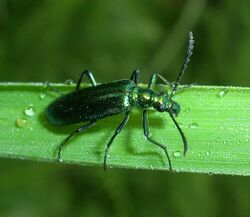Biology:Prionoceridae
| Prionoceridae | |
|---|---|

| |
| Idgia belli from India | |
| Scientific classification | |
| Domain: | Eukaryota |
| Kingdom: | Animalia |
| Phylum: | Arthropoda |
| Class: | Insecta |
| Order: | Coleoptera |
| Suborder: | Polyphaga |
| Infraorder: | Cucujiformia |
| Superfamily: | Cleroidea |
| Family: | Prionoceridae Lacordaire, 1857 |
Prionoceridae is a small family of beetles, in the suborder Polyphaga. They form a group within the cleroid beetles and were formerly treated as a subfamily (Prionocerinae) within the family Melyridae. Very little is known of their life history but most species are pollen feeders as adults and occur in large numbers during spring or the host flowering season. Larvae are predatory or feed on decomposing wood.
Description
Beetles in the family are elongate with soft elytra. The elytra are often covered with rows of hairs. The margin of the eyes are not round but notched anteriorly. The head faces forward (prognathous) and the clypeal region is produced into a short flat snout. Each of the legs have five tarsi (5-5-4 in the Oedemeridae) with simple claws and a single spur on the pro-tibia. Male Idgia and Prionocerus have a comb on the inner edge of the distal tarsal segment of the foreleg.[1] The genera Nacerdes and Xanthochroa in the family Oedemeridae and some Cantharidae bear resemblance to some of the Prionoceridae.[2]
Members of the family were formerly included as a subfamily within the closely related Melyridae (the genus Lobonyx in Dasytinae). The fossil record of Prionoceridae has been recorded from the Middle Jurassic Daohugou beds of China (Idgiaites jurassicus), the Cenomanian Burmese amber (Cretaidgia burmensis)[3] and Ypresian Hat creek Amber from Canada (Prionocerites tattriei).[4][5][6]
Diversity
There are around 150 species in three genera; Idgia Laporte, 1836 (Palaeotropical), Lobonyx Jacquelin du Val, 1859[7] (mostly Palaearctic), and Prionocerus Perty, 1831.[8][9]
The following is a partial list of the species that have been described (the generic placement and validity are unverified and likely to be out of date):
- †Cretaidgia Zhao, Liu & Yu, 2021[3]
- †C. burmensis Zhao, Liu & Yu, 2021
- Idgia Laporte, 1836
- See genus article
- †Idgiaites
- †I. jurassicus
- Lobonyx Jacquelin du Val, 1859
- †Prionocerites Lawrence, Archibald, & Ślipiński, 2008
- †P. tattriei Lawrence, Archibald, & Ślipiński, 2008[4]
- Prionocerus Perty, 1831
- P. bicolor Redtenbacher, 1868
- P. caeruleipennis Perty, 1831
- P. championi Geiser, 2010
- P. malaysiacus Geiser, 2010
- P. paiensis Geiser, 2010
- P. opacipennis (Pic, 1920)
- P. viridiflavus Geiser, 2007
- P. wittmeri Geiser, 2010
References
- ↑ Champion, G.C. (1919). "The Malacoderm genera Prionocerus and Idgia and their sexual characters". Annals and Magazine of Natural History 9 (3): 325–372. doi:10.1080/00222931908673830. https://archive.org/stream/annalsmagazineof931919lond#page/324/mode/2up.
- ↑ Aston, Paul (2011). "Prionoceridae Lacordaire 1857 of Hong Kong and Guangdong Province, China (Coleoptera; Cleroidea)". Hong Kong Entomological Bulletin 3 (1): 2–6. https://archive.org/stream/HongKongEntomologicalBulletinVol3-1/HkebVol.31#page/n1/mode/1up.
- ↑ 3.0 3.1 Zhao, Y.; Liu, Z.; Yu, Y.; Shih, C.; Ślipiński, A.; Ren, D. (2021). "First species of Prionoceridae from mid-Cretaceous amber of northern Myanmar (Coleoptera: Cleroidea)". Cretaceous Research 133: Article 105118. doi:10.1016/j.cretres.2021.105118.
- ↑ 4.0 4.1 Lawrence, J.F.; Archibald, S.B.; Ślipiński, A. (2008). "A new species of Prionoceridae (Coleoptera: Cleroidea) from the Eocene of British Columbia, Canada". Annales Zoologici 58 (4): 689–693. doi:10.3161/000345408X396620.
- ↑ Liu, Zhenhua; Ślipiński, Adam; Leschen, Richard A. B.; Ren, Dong; Pang, Hong (2015). "The Oldest Prionoceridae (Coleoptera: Cleroidea) from the Middle Jurassic of China". Annales Zoologici 65 (1): 41–52. doi:10.3161/00034541ANZ2015.65.1.004.
- ↑ 6.0 6.1 Yuxia, Yang; Geiser, Michael; Xingk, Yang (2012). "A little-known beetle family in China, Prionoceridae Lacordaire, 1857 (Coleoptera: Cleroidea)". Entomotaxonomia 34 (2): 378–390. https://biogeography.unibas.ch/PDF/2012_Yang,%20Geiser%20&%20Yang.pdf.
- ↑ Constantin R. (2009). "A revision of the genus Lobonyx Jacquelin du Val, 1859, of Central Asia, with the description of a new species from Nepal (Insecta: Coleoptera, Prionoceridae)". in Hartmann M, Weipert J. Biodiversität und Naturausstattung im Himalaya, Band 3. Erfurt: Verein der Freunde & Förderer des Naturkundemuseums Erfurt e.V.. pp. 299–311.
- ↑ Geiser, Michael (2010). "Studies on Prionoceridae (Coleoptera: Cleroidea). II. A revision of the genus Prionocerus Perty, 1831". Zootaxa 2328: 1–48. doi:10.11646/zootaxa.2328.1.1. http://borneobeetles.myspecies.info/sites/borneobeetles.myspecies.info/files/2010_Geiser%20Prioniceridae.pdf.
- ↑ Geiser, M. (2007). "Studies on Prionoceridae (Coleoptera, Cleroidea). I. A new species of Prionocerus Perty, 1831 from Sumatra.". Entomologica Basiliensia et Collectionis Frey 29: 167–170. https://biogeography.unibas.ch/PDF/2007_Geiser_PrionocerusfromSumatra.pdf.
Wikidata ☰ Q264839 entry
 |


